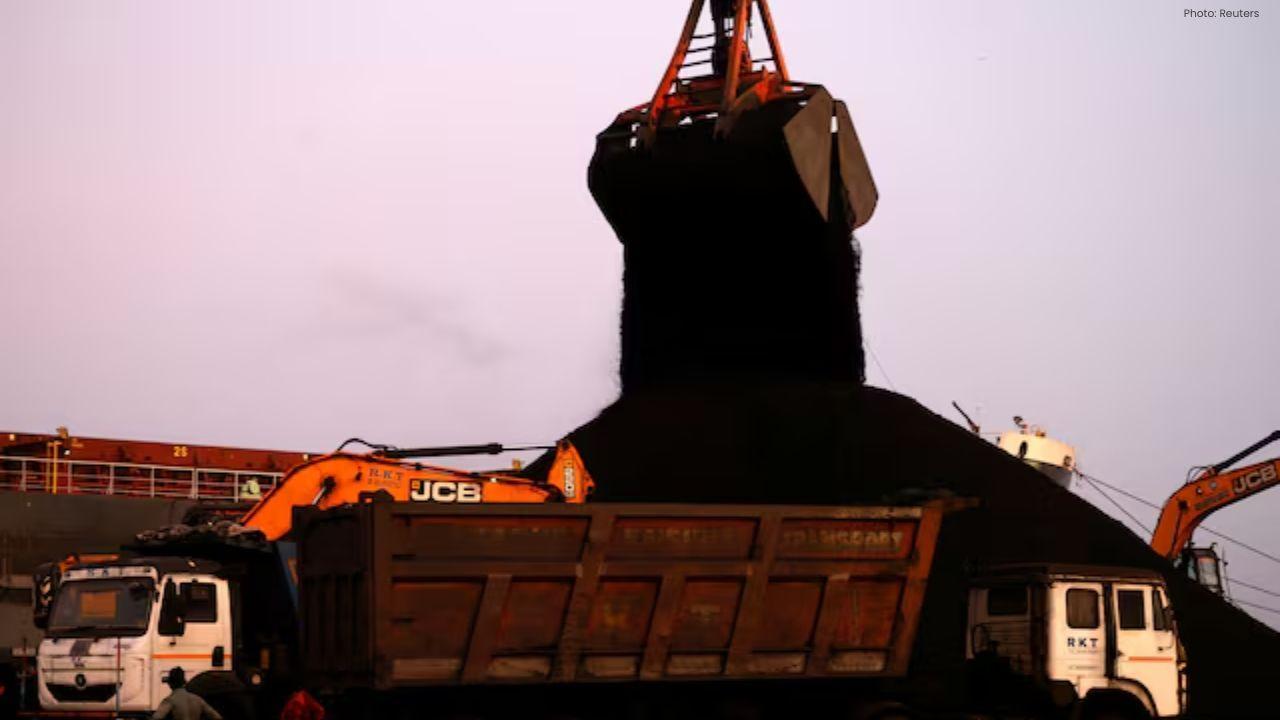
Post by : Mumtaaz Qadiri
India is planning a nationwide program to capture and store carbon emissions from coal power plants. The government will offer incentives that cover up to 100% of project funding for some initiatives. This program aims to reduce emissions from India’s large coal power fleet, which continues to grow every year.
Rajnath Ram, an energy adviser at NITI Aayog, India’s government policy think tank, explained that the incentives are meant to help industries adopt carbon capture technologies. These technologies can then be integrated with existing coal-based energy systems to make them cleaner and more sustainable.
Coal Remains Central to India’s Power
Coal continues to play a key role in India’s electricity generation. About 60% of India’s total power comes from coal. New coal-fired power plants are still being built, and the country relies heavily on coal to meet the growing electricity demand.
Rajnath Ram emphasized that coal will remain an important part of India’s energy system for the next two decades. The government’s focus is not on eliminating coal but on using it more sustainably. Installing carbon capture and storage (CCS) systems is one of the ways to achieve this goal.
Why Carbon Capture Is Important
Carbon capture and storage systems are technologies that prevent carbon dioxide from being released into the atmosphere. They can be installed in coal power plants to reduce emissions significantly. By capturing carbon before it leaves the plant, these systems help fight climate change while allowing India to continue using coal for electricity.
Experts believe that carbon capture can make coal plants much cleaner and allow India to balance its need for energy with its environmental goals. These systems will also help India meet international commitments to reduce greenhouse gas emissions.
Coal Capacity Growth in India
In 2024, India installed 4 gigawatts (GW) of new coal-fired power capacity. This is the same as the high level reached in 2023 and the highest since 2019. The government plans to add up to 90 GW of coal capacity by 2032 to meet the increasing power needs of the country.
Even though India is rapidly increasing renewable energy production, coal will still be needed for reliable baseload electricity. This ensures that homes, factories, and businesses receive power even during periods when solar or wind energy is not available.
Renewable Energy Growth
India has achieved significant progress in renewable energy. The country reached its goal of having 50% of installed electricity capacity from non-fossil fuel sources five years ahead of schedule, as of July 2025. This includes solar, wind, and hydroelectric power.
However, installed capacity does not always translate into electricity generation. Renewable energy depends on weather, battery storage, and the power grid. If the sun does not shine or the wind does not blow, India will still need coal to avoid blackouts.
Incentives to Encourage Carbon Capture
The government’s incentives will encourage industries and power companies to invest in carbon capture technologies. Some projects will receive full government funding, while others may get partial support. The goal is to make CCS adoption more affordable and attractive to private companies.
By supporting these projects, India hopes to reduce pollution, improve air quality, and contribute to global efforts against climate change. The program will also create jobs in the energy and technology sectors.
Coal Use and Climate Goals
Coal will continue to be an important part of India’s power system for the next 20 years. The key challenge is how to use it in the most environmentally friendly way. Carbon capture technologies are essential to achieve this.
India’s energy policy balances coal use with renewable energy expansion. This approach allows the country to maintain reliable electricity while moving toward a greener energy future.
Meeting Energy Demand
India’s power demand is rising due to population growth, industrial development, and urbanization. During heat waves, coal power becomes especially important to prevent blackouts and provide reliable electricity.
Carbon capture programs will allow India to continue using coal to meet this demand while reducing harmful emissions. This helps protect both the environment and public health.
Long-Term Benefits
The carbon capture program will have long-term benefits. It will reduce emissions, support sustainable development, and help India meet its climate commitments. Industries adopting CCS technologies will be able to operate more efficiently and with less environmental impact.
The program also aligns with India’s broader energy strategy, which combines renewable energy growth with cleaner coal use to ensure a stable and sustainable energy supply.
India’s nationwide carbon capture and storage program is a major step toward reducing emissions from coal power plants. With full government funding incentives for some projects, the program encourages industries to adopt sustainable practices. Coal will remain a key energy source, but these technologies ensure that it can be used more responsibly. India continues to expand renewable energy while using carbon capture to reduce the environmental impact of its existing coal fleet. This approach balances the need for reliable electricity with climate protection goals.
Carbon Capture Technology, Coal Power Emissions, Renewable Energy Integration, Sustainable Energy Use










Indian Airlines Resume Flights to Kathmandu After Nepal Unrest Ends
Indian airlines resume normal flights to Kathmandu as Tribhuvan Airport reopens, helping stranded pa

India Launches Carbon Capture Program With Full Funding Support
India announces nationwide carbon capture program with incentives up to 100% funding to reduce emiss

Google Launches AI Plus Subscription For Easy Access To Tools
Google introduces AI Plus, a new affordable subscription offering Gemini 2.5 Pro AI, Veo 3 video too

Larry Ellison Challenges Elon Musk In Race For Richest Person
Larry Ellison briefly passed Elon Musk as the world’s richest man after Oracle’s stock soared, showi

Tina Charles Wins WNBA Award For Leadership And Community Service
Tina Charles wins the Dawn Staley Award for leadership and community work, highlighting her foundati

Shivam Dube Shines As India Crush UAE In Asia Cup T20 Match
Shivam Dube starred as India defeated UAE by nine wickets in Asia Cup T20. Dube credited coach Morne